Newsletters: 1997
Click on the topic from the contents or scroll the page.
- Highlights - Bill Warnock N.D.
- Dr. Klimas Lecture
- A Letter from Senator Jeffords
- Dr. Komaroff Lecture Highlights
- A Letter from Senator Leahy
- Public Radio on CFIDS
- Dr. Plante Speaks Out!
- Dr. Komaroff Disability Notes
- Sattelite Video Conference
- Gulf War Syndrome
- Satellite Conference Details
- NIH Conference Buyer Beware!!!
- Dr. Sudaholnik's Work Replicated!
- Stealth Virus Reseach
- Editorial: A Continued Statement of Purpose
- The DollHouse Raffle
- A Working Physicians List
- Increased Homocysteine Levels...
- Multiple Chemical Sensitivities
Editors: Lisa & Kal Marshall
The VT CFIDS Association Inc. became an official organization devoted to the support of Persons With CFIDS (PWC's) in January 0f 1997. The association was formed to offer information, assistance, and a network of support for the PWC's of Vermont. The association has many goals. One is to establish a network of health v=care providers actively trained in the care of CFIDS, and with this network, establish an out-patient clinic. We are a clearinghouse of CFIDS information, articles, letters, theories, books, and in turn would like to set up a lending library by mail. In addition we are trying to produce a monthly newsletter to help keep the PWC's of Vermont connected and informed.
We can be reached at 1-800-296-1445. We are a place to talk and a place to listen but we do none of this quickly, We are all volunteers and most of us are ill. Find us to share your thoughts, advice, and articles. Our goals are to help ourselves and conquer this disease. We will do both.
May 12th is CFIDS Awareness Day! We need volunteers to help prepare for this special event. We would especially like to hear from anyone who has previously attended or helped plan for this event in the past.
The VT CFIDS Association, Inc. (The Outlook) does not dispense medical advise or endorse any specific medical theory or product and assumes no responsibility for any medical treatment or other activity undertaken by readers of this newsletter. For medical advice please consult your health care provider.
Highlights from Dr. Bill Warnocks Presentation
By Lisa Marshall
Dr. Bill Warnock is Vermont's 1st Naturopathic physician, founder of the Lake Champlain Center for Holistic Medicine and has been practicing in the state for twelve years. Dr. Warnock spoke at the Feb. 19th Essex Junction meeting regarding his treatment methods for CFIDS. He began by talking about the symptoms of CFIDS and the theories of the causes of CFIDS. The two hour meeting included a very thorough discussion and question period. The following is a brief summary:
1. DHEA (Dehydroepiandrosterone) A hormone produced by the adrenal glands that tends to be low with CFIDS (it also decreases with age). You need to test saliva or blood level prior to use if testing indicates the need for DHEA, he recommends retesting in three months and then on a yearly basis. side effects, acne and hair growth. the way to reduce some of the side effects is to take the sublingual drops (only available by prescription) instead of the oral form of DHEA It is also important to note that DHEA stimulates all glands to function at a higher level so you must check with your physician if you have a thyroid condition or diabetes prior to starting DHEA.
2. Melatonin: produced by the pineal gland lower levels of melatonin in CFIDS Melatonin helps you to go into a deep sleep. Reactions to Melatonin: Other drugs such as Advil, Klonopin and Tylenol can deplete Melatonin levels. certain anti-depressants are contra-indicated with Melatonin. Dosage: start with 3mg sublingual (sublingual is preferred because it gets absorbed directly into the bloodstream).
3. St John's Wort an herb which increases serotonin (major neurotransmitter derived from tryptophan) levels which tend to be low in CFIDS and stimulates T-cell (lymphocytes) activity natural way of treating depression. Side effect sensitivity to sun. Dosage standard extract - .3% hypercin 300mg 3X a day for a 120-150 lb. Person adjust dose by weight accordingly see results in a few days.
4. Gingko Biloba mild herb which also increases serotonin levels increases peripheral circulation which helps with tingling in extremities increases blood to brain works well with St Johns Wort. Dosage standard: standard extract 24% gingkoflavonglycosides 150-200mg/day in devided doses takes six weeks to see results.
These were the major treatments that were discussed. Dr. Warnock also mentioned that Coenzyme Q-10, malic acid and magnesium can help increase oxygen carrying capacity in the muscles and reduce muscle fatigue. Vitamin C was referenced as an inexpensive way of stimulating T-cells and selenium was discussed because of its ability to increase immune function. In addition, cayenne red pepper ointment (topical application) can be helpful in Fibromyalgia by depleting substance P levels and thereby reducing pain. If you are interested in pursuing treatment by Dr. Warnock, please contact him at 802.985.8250.

Editors: Lisa & Kal Marshall
May 12th A Huge Success! See Insert For Details
Dr. Klimas Lectures to A Full House
By Lisa Marshall
Dr. Nancy Klimas, M.D. is a renowned CFIDS researcher and clinician from the University of Miami Medical Center. Dr. Klimas is also the editor of the Journal of Chronic Fatigue Syndrome and President of the American Association of Chronic Fatigue Syndrome. Dr. Klimas spoke at the MASS. CFIDS Spring Lecture Series on April 27 and gave a three hour presentation/discussion. She did have a formal presentation prepared but stated that she was was more interested in having an informal discussion and focusing on answering questions from the group. Because of this format it is difficult for me to adequately share the incredible amount of knowledge she shared with the group. I will try to share some of the information from both her formal lecture and replies that were given to questions.
Dr. Klimas began by discussing the new case definition for CFS.
-debilitating fatigue existing for six months or longer
-greater than 50% reduction in activity.
At least four of these eight symptoms:
1. Impaired memory of concentration
2. Sore throat
3. Tender cervical or axillary lymph nodes
4. Muscle pain
5. Multi joint pain without joint swelling or redness
6. New headaches
7. Unrefreshing sleep
8. Postexertion malaise lasting more than 24 hours
There was a discussion about the possible triggers for CFS 60-84% of CFS patrients describe an acute onset acute EBV followed by CFS acute B. Burgdorferi (Lyme Disease) followed by CFS - acute CMV followed by CFS. Dr, Klimas stated that almost all CFS patients remember the day it started which is not true for FM. A much smaller percentage of FM patients describe an infectious onset.
Some of the possible triggers discussed:
Retroviruses (HIV, HTLV-1, HTLV-2) not a likely cause research never strongly supported this as a cause, but research was never completed, so can't completely rule it out.
Enteroviruses (parent of polio virus) recent research showed muscle biopsies of CFS patients loaded with Enteroviruses, but researchers were disappointed when controls showed same result, but it turns out controls were not very healthy, so it is still a possibility.
Herpesviruses- many herpesviruses discovered a very large family of viruses Human Herpes Virus Six (HHV-6) is the most interesting.
Viral theory does not seem all that likely, but can't dismiss a viral theory when there are many viruses we don't know the name of.
Immunology Highlights In a healthy individual, the immune system is basically a resting army and only 20% activated. In CFIDS, the immune system is 60-80% activated. The entire body feels this over activation of the immune system. Klimas says she has no doubts that the over production of chemicals (ie. 11-2) by the immune system and neuroendecrine chemicals makes us feel sick and hurt all over. The "chemical cloud" is also what causes the cognitive problems and makes thinking difficult. Klimas would like to see CFIDS renamed Chronic Immune Activation Syndrome.
Natural Killer Cells primitive immune system (this was entire immune system for dinosaurs and only immune system shark has) it is simple not very clever sees things as self or non-self. a clean up system picks up pieces if rest of immune system is not working.
Natural Killer Cells Near 0 in CFIDS In Japan they call CFIDS Low Natural Killer Cell Syndrome. NK cell deficiency can come and go with relapses with CFIDS, but is usually always abnormal. Sometimes NK cell count may be normal, but activity of NK cells may be low.
Cognitive Function Testing Attention, concentration and distractibility are key areas to look at in CFIDS. a question was asked on how to distinguish between CFS and Alzheimers Klimas said a cognitive psychologist can do psychometric testing to distinguish between the two, because the test results will be different. There is no treatment for the cognitive dysfunction associated with CFIDS. Klimas uses Prozac because sometimes it can enhance concentration and memory. Ritalin has been tried anecdotally, but there have been no placebo trials. She gave a CFIDS patient 5mg of Ritalin and they became psychotic witrh hallucinations BE VERY CAREFUL!!!
Does illness change over time?
Dr. Cheney reported that only 2% recover in the first three years, but that was based on his experience and not a formal study. A recent study was done indicating that the length of illness does not predict recovery and that the recovery rate is about 20%.
Other topics were discussed as NMH, sleep studies, medications for sleep and the need for drug holidays from sleep meds etc. The Klimas video tape is available to MASS CFIDS members.

Physicians Questionnaire:
The following is a proposed questionnaire for our physicians and health care providers directory. Please submit your changes and/or corrections.
Date:
Name:
Address:
City/State/Zip
Telephone
Fax
Specialty
Board Certified? Y/N
Medical School / Residency (or alternate training)
If yes, which one(s)
Would you accept assignment on ability to pay? Y/N
Will you accept a Medicaid patient who has lost a job due to illness? Y/N
Do you currently have any CFIDS patients? Y/N
How many? Y/N
What is your opinion regarding the etiology of CFIDS?
What is your treatment approach for CFIDS? (If not an MD, please tell us how you use your training to help CFIDS patients.)
Do you have the capacity and resources to diagnose CFIDS in a clinical manner which will aid patients in obtaining benefits for disability, if that becomes their only option? Y/N
A letter from Senator Jeffords:
Re: May 12: International CFIDS Awareness day
James M. Jeffords
United States Senate
May 12, 1997
Rik Carlson
VT CFIDS Association, Inc.
P.O.Box 3162
Burlington, VT 05401-3162
Dear Mr. Carlson and Friends,
I apologize that my schedule in Washington keeps me from personally acknowledging your efforts here today on behalf of the Vermont Chronic Fatigue and Immune Dysfunction Syndrome Association. You are all to be commended for your efforts to expand education and research relating to this serious and complex illness.
I have been very distressed to learn how prevalent CFIDS is in Vermont. I have learned this primarily through the numbers of letters and phone calls I have received from CFIDS sufferers and advocates over the past few years. For that, I first need to express my appreciation for your effective voice with respect to CFIDS. On the other hand, your work has in part, brought to light the fact that we still know little about CFIDS, and thus have a ways to go towards understanding this illness.
Over the past couple years, I have been pleased to learn of the progress which has recently been made in establishing the natural history of CFIDS the first step towards both defining and curing the disease. However, as I previously stated, much more needs to be done.
As many of you know, I recently assumed the Chairmanship of the Senate Committee on Labor and Human Resources. This committee has broad jurisdiction over many of the Nation's health, disability, and social policies and programs. The National Institutes of Health fall under the jurisdiction of my committee and later this year, I will seek to reauthorize the NIH, which is charged with conducting and supporting biomedical research focused on human illness and health. Although funding for the NIH has increased recently, more needs to be done to assure that illnesses, such as CFIDS, are effectively addressed and researched. Please be assured that I understand the importance of continued support of the NIH as it is necessary to the future health of CFIDS sufferers.
With that said, I thank you again for allowing me to be part of this special and important day.
Sincerely
James M. Jeffords
International CFIDS Awareness Day May 12th Montpelier, Vermont
Just as we arrived in Montpelier, the rain stopped and not a drop fell again until the ride home. It was meant to be. The advertising we did for this event was very effective. Many new people found us and are being added to the ranks on a daily basis. Many newspapers ran features and WPTZ TC Channel 5 put together a very impressive piece for their evening news.
Needless to say, many of us were physically unable to attend and for those of us who were there, the recovery process continues.
Jess Huber from Senator Jeffords office attended and delivered a letter from the Senator which is enclosed. Linda Johnson delivered a very emotional and powerful speech and we heard from Emily Murphey, the Fibromyalgia group leader in Barre.
We looked good. The T-shirts and banners had impact and we have expanded our base and ability to impact our future. We will now continue to develop our Physician and health care providers directory. A sample letter to physicians is enclosed. Share your thoughts.
Special thanks to:
Rep. Patricia Doyle, D-Richmond
Rep. James MacNamara D-Burlington
Senator James M. Jeffords
Arty LaVigne & WIZN Radio 106.7 FM
Mark Johnson & WKDR Radio 1390 AM
WPTZ Channel 5
Dr. Charles Anderson
Gov. Howard Dean, M.D.
Barbara Carlson
Pam Avery for the T-shirts and banners
Linda Johnson for the Physicians banner
Linda, Pam and Raymonde for their media work
Lisa Marshall for the newsletter
And Mary, for being Mary
T-Shirt Art, May 12 1997
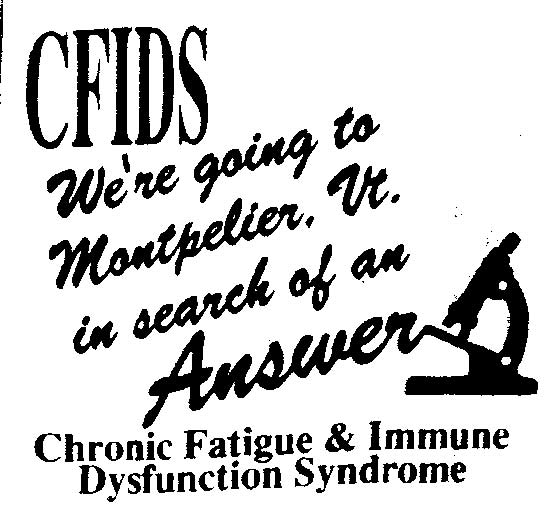
Editors: Lisa & Kal Marshall
Dr. Komaroff Returns to Give 5th Annual Lecture!!!
by Lisa Marshall
Dr. Anthony Komaroff MD has been a renowned Harvard CFIDS researcher for over a decade. Dr. Komaroff is also director of the CFIDS Research Center and chief of General Medicine at Brigham & Women's Hospital and Harvard Medical School. He was recently elected to the Interagency Coordinating Committee for CFS. He presented his annual lecture at the MASS CFIDS spring lecture series on June 8. He began by stating that his research group had published 10 CFS papers last year. His research continues to focus on three areas:
1. What are the causes of CFIDS?
2. The search for diagnostic tests for CFIDS.
3. A newer focus has been the role of various hormones in CFIDS
His lecture involved presenting some of the info from his recently published papers, discussing some of the papers from last years conference in San Francisco, and presenting other interesting CFS papers published this year. I will share with you some of the highlights from his lecture. In 1996, he published (Amer J Med) the results of a research study designed to answer the questions "How badly are people debilitated with CFIDS as compared to other illnesses". The instrument used to measure the level of function of the individuals in this study was SF36 which is the best studied and acceptable instrument used to measure levels of function in any kind of illness. This instrument that measures health status has 8 scales ranging from physical function, bodily pain to mental health, etc. The higher the scores on any of these scales, the higher the person is functioning. He presented a detailed graph that summarized the study very well. Here is my description of the graph.
Top Line: Represented 2500 healthy people from the population at large was the highest line thereby indicating the highest level of functioning.
Next Line: Heart Failure Patients scores are lower than general population except for mental health scores which were the same.
Next Line: Depressed Patients scores are lower than general population and are particularly lower for mental health.
Bottom Line: 223 CFIDS Patients level of function is lower than all other groups accept when it comes to mental health. CFIDS patients have a different mental health score and picture compared to patients with depression. CFIDS patients had a mental health score similar to the heart failure patients and the general population at large.
This study says two things:
1. At least by self report patients with CFIDS are really badly debilitated in comparison to patients with other illnesses.
2. CFIDS patients are debilitated in a way and with a pattern different from what you see in major depression.
Infectious Agents as Triggers of CFIDS
Many CFIDS cases, but not all, are triggered by an infectious agent, however he does have two problems with infectious agents as triggers:
1. No infectious agent has been proven beyond doubt to cause this
2. He doesn't believe that 1 novel agent will be the cause of CFIDS.
Research Updates on Infectious Agents
1/ Borna Disease Virus or Borna Virus He became interested in the theory that this virus could cause CFS because this virus can infect many different types of animals, unlike most viruses which can infect only one animal type and when it does it causes an infection of the BRAIN. About five years ago, he did studies with earlier technology that showed this virus could probably not infect humans, so it was an unlikely cause of CFS. In the last two years with the development of better technology for diagnosing this virus, it is now clear to him that this virus can infect humans and he has found it in CFS patients, but he has also found it in healthy people. So at this time there isn't any persuasive evidence that this virus is a cause of CFS.
2/ Mycoplasma this infectious agent is not quite a virus and not quite a bacteria but if you had to classify it, it would be closer to a bacteria than a virus. A new kind of mycoplasma was discovered about 8 years ago and he than began to study it to see if it was involved with CFS. His first studies were negative with the crude technology available at the time for diagnosing mycoplasma. Last year at least two research groups have claimed with more powerful technology to have found Mycoplasma more often in CFS patients than healthy people, although they did find it in healthy people too. The Walter Reed Army Medical Center Laboratory which discovered this Mycoplasma is currently working with Dr. Komaroff to see if Mycoplasma may be related to CFS.
3/ Chlamydia Pneumoniae (C.P.) is also an organism that is not quite a bacteria or a virus, but is closer to a virus than a bacteria. In the last few months, a group in Nashville, TN at Vanderbilt University has raised C.P. as a possible cause of CFS. Dr. Komaroff helped discover C.P. in 1982 as a cause of pneumonia in adults. The Nashville group thinks C.P. may be a cause of CFS, as the body continues to fight it, causing the symptoms of CFS. Dr. Komaroff studied C.P. as a possible cause of CFS 7 years ago, but found no evidence to support this. But with the development of more powerful technology, this group may have discovered something he missed. Dr. Komaroff has not seen any of their results yet, so he was unable to make a judgement on this agent as a potential cause.
4/ Human Herpes Virus (HHV-6) The problem with HHV-6 is that it is found in nearly everyone, so it is hard to study as the cause of any condition, but it is usually asleep in most humans. However, his hypothesis, that he has studied for ten years, is that there are some people where it awakens and begins to reproduce and as a consequence, it contributes to an illness or produces symptoms. This virus was of interest to him because it can infect a wide number of cells in the body. Most viruses are fairly limited to the number of cells they can infect, but this virus can infect many different immune system cells cells in the throat, muscles, intestines, stomach and brain, and all of these organs are involved in CFS. In 1992 he published research showing this virus is reproducing itself more often in CFS patients than healthy people. The question is whether this had anything to do with why they were sick was it the cause of the sickness or an effect of the sickness. We still don't know the answer to this question definitively, but there have been several important new discoveries. Last year, studies by other groups have shown this virus can infect the brain and cause various illnesses in the brain. It has been shown that the virus gets into the brain and causes disease in people whose immune systems are compromised (ie. AIDS). It is also associated with Multiple Sclerosis (MS), and other MS like-diseases and that is of interest, because in patients with CFS, there are some brain imaging pictures that have some similarities to MS. In late 1995, a study by the national Academy of Sciences caught the world's attention. The study was of autopsy specimens from brains of patients with MS, patients with other neurological diseases and patients who died of non-neurological diseases. The study found evidence of this virus around the parts of the brain "the plaques" that are effected by MS 80% of the time and in other parts of the MS brains 24% of the time, but the virus was never found in the brains of patients with non-neurological diseases. It is now more plausible to say that this virus, which appears to be reactivating in patients with CFS, can induce inflammation of the brain. Please see MASS CFIDS videotape for more details.

A letter from Senator Patrick Leahy
May 21, 1997
Ms. Lisa Marshall
RR 1 Box 274
E. Montpelier, VT 05651
Dear Ms. Marshall.
Thank you for your letter regarding Chronic Fatigue and Immune Dysfunction Syndrome (CFIDS). I am sorry to learn that you suffer from this disease and appreciate you contacting me on International CFIDS Awareness Day.
I know the difficulty this disease imposes on you and some 500,000 other adults around the country. CFIDS affects the body and the mind in a multitude of ways causing extreme fatigue and making even the most routine activities physically exhausting. Although there have been significant research developments in recent years, CFIDS continues to elude scientists and researchers. Despite a decade of research, the cause of this disease is still unknown, there is no definitive tests for diagnoses, and a cure has yet to be found. Too many questions remain unanswered.
This year through both the National Institutes of Health (NIH) and the Centers for Disease Control (CDC), President Clinton has included in his fiscal year 1998 budget
A total of $13.7 million for the continued research of CFIDS. I strongly support the Presidents budget and am hopeful that this important funding will expedite the discovery of a cause of and more important, a cure for CFIDS.
Again, thank you for contacting me. I know how important this is to you and assure you I will keep your thoughts i9n mind during the appropriations process.
Sincerely
Patrick Leahy United States Senator
A Message From the President
On May 22nd I appeared with Dr. Dennis Plant on Vermont Public Radio's "Switchboard", a call-in talk show, to discuss CFIDS. I have the show available on tape (no transcripts). Below is my follow-up letter that I sent to the host of the show, Steve Zind. rik carlson
Vermont Public Radio
Attn: Steve Zind
1079 Ethan Allen Avenue
Colchester, VT 05446
Dear Steve,
I want to thank you for allowing our discussion of CFIDS on May 22nd. The response has been helpful and supportive. I have spoken to a number of people who tried to call and were unable to get through and with others who listened. The show has enabled me to send information to many people (there were eighteen calls on voice mail) and has stimulated conversations with other health care professionals who in turn will help their patients. And that was the goal.
Dr. Plante told me before the show that he really has no interest in this disease (he referred to it as an entity), that he is seeing no patients with this disease and that his staff advised him not to do the show because they didn't want to field the calls. I'm sure he's a fine physician, but his disinterest in CFIDS was apparent.
If we have the opportunity to follow up at some point I would like to suggest either Dr. Charles Anderson in Essex or Dr. Bill Warnock in Shelburne as representing the medical community. These two men are not only well versed in the history and treatment of CFIDS, but they see CFIDS patients regularly and treat them with compassion and dignity. Their point of view would greatly expand the knowledge and insights we need to share in order to restore our health.
Thanks again, and I look forward to when we can continue our conversation.
Sincerely
Rik Carlson
Dr. Plante Speaks Out
Dear Rik
One of my patients in the business community sent me his copy of The Outlook which he had received in the mail. He thought it important that I be aware of what you had written about me in your letter to Steve Zind of VPR. I was surprised and very disappointed by your comments about our informal conversation prior to the airing of "Switchboard". My initial feeling was to assume that you didn't process the information correctly because of cognitive impairment associated with your CFIDS condition. However, the more I reflected, the more I feel compelled to write to you to provide clarification.
First, you are wrong in stating the I have "no interest in this disease". If I weren't interested in the syndrome I wouldn't have agreed to participate in the Switchboard program and wouldn't be giving a continuing medical education talk this summer about CFIDS and Chronic Fatigue. I am as interested in CFIDS as any other medical condition that I see in primary care.
Secondly, I am seeing patients with CFIDS (I currently have four patients with CFIDS) and have evaluated hundreds of others with fatigue as part of routine primary care practice. My actual comment was that I am not accepting any new patients with chronic fatigue or CFIDS because my current practice is closed for any new patients. My hesitation in talking about chronic fatigue and CFIDS has nothing to do with not wanting to care for such patients. My hesitation is that my office staff invariably receive a number of phone calls from patients who either want me to become their doctor (you actually called me about this issue recently!) or who want advice about their case over the phone. My practice is too busy at this time to deal with either of these issues. Patients become quite upset when they aren't able to have access to a physician. Since the Switchboard program, my office has dealt with a dozen phone calls from patients (or parents of patients). My staff and I do not like having to say "No" to people.
I feel you need to "correct" the information you have stated about me in your newsletter. As a former business owner you know the value of a person's reputation.
What you have stated about me is simply wrong. To adhere to such opinions about me will not further your cause of increasing the awareness of CFIDS in the mainstream medical community. A number of my colleagues still believe that CFIDS is primarily a psychiatric illness. I feel it's important to present a balanced view based on the literature. I will continue to talk about CFIDS in the primary care community in order to promote awareness and understanding. Your comments to Steve Zind only serve to marginalize your cause out of the mainstream primary care community and is a disservice to my patients with CFIDS.
Dennis Plante, M.D.
Dr. Plante,
I apologize for any misunderstanding on my part and will print your response in the next newsletter. Perhaps we can begin a dialogue. We are very ill people in search of medical help.
You mentioned that you don't like having to say "no" to people. When I found you, I was turned away. As opposed to leaving us to fend for ourselves, perhaps you could refer us to another, or suggest a course of action within the scope of our insurances that would at least point us in the right direction.
When people with CFIDS are dismissed, they worsen.
I deeply regret any harm I may have caused.
Sincerely, Rik Carlson
Rik
I don't know how to "open up" access for PWCs within the Primary Care community to meet their diverse needs. Obviously, part of the problem is in dealing with the multiple levels of care needs (patient evaluation, symptom care, disability evaluation and certification, psychological support, etc.) on the part of the PWCs and the time constraints on the part of the Primary care providers. What would be useful for a "dialogue" would be in identifying what the various "needs" are for PWCs with respect to the Primary Care provider, and what the PWCs perceive as "barriers" for their needs. Identifying the "problems" and "barriers" that the primary care providers perceive in caring for PWCs would also be useful. By identifying the "customer-supplier" needs and barriers, progress could be planned out.
Dennis Plante, M.D.
Lisa Marshall has submitted notes which complete her coverage of the Dr Komaroff Lecture:
Recommended Tests for Disability Applications
Dr. Komaroff was asked what tests he would recommend when applying for disability-this is a synopsis of his answer:
He said that the 2 "markers" Of CFS which have stood the test of time are the Immune Activation and the low levels of Natural Killer Cells and low activity of Natural Killer Cells. However, these were the 3 tests he would recommend:
(1) Differential White Blood Cell Count
He would specifically look for atypical lymphocytes (which are mishapen lymphocytes), because these are found more often in CFS patients than healthy individuals and he published a study to support this. (Again, it is not always found in all CFS patients and it is found in other diseases like Mono)
(2) Levels of Immune Complexes
These levels need to be measured by a very sensitive assay using radioactivity.
He published a study showing undeniably striking differences in the levels of immune complexes in people with CFS as compared to healthy people.
(3) Total Complement
He recently completed this study, but hasn't published the results yet. In Lupus, very low levels of complement are found and he expected to find that result in CFS patients. However, the results kept coming in VERY HIGH. About 2.5% of healthy people have complement levels above a certain level but in his study 60% of the CFS patients had elevated levels of complement.
Important Message From the
U.S. Public Health Service
Office of Public Health and Science
Chronic Fatigue Syndrome
Sattelite Video Conference
A Public Health Training Network
September 18, 1997 1:00p.m. - 3:30 p.m. eastern time
We have established a location for this conference at the Fletcher Allen Health Care, MCHV Campus
This live interactive program will provide the most current information available in the field of CFIDS. Session One, will cover the epidemiology of CFIDS, its impact on the U.S. population, and how to distinguish CFIDS from other causes of fatigue. Session Two, is an update on CFIDS research. Session Three, will cover diagnosis and management of CFIDS, and Session Four, will consist of a panel of experts answering questions posed by health care providers in the audience.
This program is being offered individually
for continuing medical education credit!
Target Audience:
Physicians including pediatricians and family practise specialists; nurses; nurse practicioners; medical and nursing students; physician assistants; pharmacists; and their colleagues who either see patients with CFIDS. or set policy for their offices, clinics, and HMO's. Other targets will be individuals responsible for insurance policies. and other private and public health organizations which determine policy regarding clinical and/or monetary benefits.
Courtesy of Anita Haviland
VA RESEARCH FINALLY DOCUMENTS
NOT ONE GULF WAR SYNDROME BUT THREE:
Chronic Fatigue Syndrome, Fibromyalgia, and Multiple Chemical Sensitivity
Research results provided to the Department of Veterans' Affairs (VA) and released in June 1997 by two of the VA's Environmental Hazards Research Centers (EHRC) document the extensive prevalence of CFIDS, Fibromyalgia, and MCS among Gulf War Veterans. The diagnosis of these syndromes in Gulf War veterans had been rejected for years by both VA and Department of Defense (DoD) officials, despite numerous recommendations from MCS Referral & Resources as far back as 1994 that they investigate the extent of these clearly overlapping disorders. Based on the random screening of 1,161 Gulf War veterans, the New Jersey EHRC reported, 28.5% of Gulf vets meet criteria for CFIDS (CDC 1994 definition). 12.5% of Gulf War vets meet criteria for MCS, and 7.0% of Gulf War vets meet criteria for both. And based on examination of 125 Gulf War vets from the northwest, the Oregon EHRC reported that, 27% of Gulf vets meet the criteria for CFIDS, 18% the criteria for FMS and that over 50% have either FMS or unexplained muscle and joint pain.
The DoD and VA and the Presidential Advisory Committee have said repeatedly that they can find "no evidence of any new or unique syndrome" among the tens of thousands of vets examined in their registry programs. Ironically, they're right! The many CFIDS, FMS, and MCS cases that researchers have finally documented are neither new or unique. But these disorders have been long ignored by both VA and DoD, which still have not trained their own physicians in their diagnosis and treatment. The new prevalence data suggest there may be tens of thousands of CFIDS, FMS and MCS cases among Gulf War vets - virtually all of which have been overlooked by VA and DoD physicians, despite years of so-called " comprehensive clinical evaluation". Given the massive extent of these undiagnosed and untreated syndromes, it is not surprising that so many veterans are still sick despite years of VA and DoD "care".
Although the VA and DoD insist their treatment programs are working, they have resisted all efforts to study this. Despite over 125 federally funded studies of Gulf War veterans underway, not one has yet addressed the health outcomes of DoD and/or VA medical care.
MCS Referral & Resources recommends 1.) informing all Gulf War veterans about the "warning signs" of these disorders and 2.) independent training programs for DoD and VA physicians and researchers on the diagnosis, reporting and treatment of CFIDS, FMS and MCS disorders.

The Vermont CFIDS Accociation, Inc.
Statement of purpose: To offer support for; to promote the treatment of and to train physicians and health care providers in the treatment of; Chronic Fatigue & Immune Dysfunction Syndrome; Fibromyalgia; Epstein Barr Virus Syndrome; Multiple Chemical Sensitivities; And Gulf War Syndrome; To encourage and support activities and events that do the same.
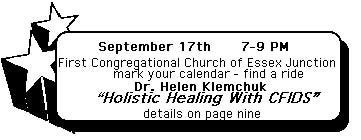
BurlingtonChronic Fatigue Syndrome:Current IssuesA Public Health Training Network Satellite Broadcast September 18th Burgess 430 MCHV 1:00 - 3:00 PM
There are only ten seats: RSVP 1-800-296-1445This live interactive broadcast will provide the most current information about the many challenges of Chronic Fatigue Syndrome (CFS). Presentations will cover the epidemiology of CFS, CFS research, and the diagnosis and management of CFS. Finally a panel of experts will answer questions posed by health care professionals in the viewing audience.Objective at the end of this program, participants should be able to provide information on the epidemiology, pathogenisis, diagnosis and management of Chronic Fatigue Syndrome.
Target Audience Physicians including pediatricians and family practice specialists; nurses; nurse practicioners; medical and nursing students; physician assistants; pharmacists; and their colleagues who either see patients with CFS or set policy for their offices, clinics and HMO's.
Speakers
Debra Buchwald, MD, Associate Professor, Department of Medicine, University of Washington, School of Medicine, Seattle, WA.
Mark A. Demitrack, MD Clinical Research Physician, Eli Lilly Research Laboratories, Indianapolis, IN.
Anthony Komaroff, MD Professor of Medicine, Harvard Medical School; Director, Division of General Medicine and Primary Care, Brigham and Women's Hospital, Boston, MA.
Philip R. Lee, MD, Former Assistant Secretary for Health, Office of Public Health and Science, Department of Health and Human Services. Current Professor Emeritus, University of California, San Francisco.
William C. Reeves, MD, Chief, Viral Exanthems and Herpesvirus Branch, Division of Viral and Rickettsial Diseases, Centers for Disease Control and Prevention (CDC).
Alexis Shelokov, MD, Director of Medical Affairs, The Salk Institute, Government Services Division, San Antonio, TX Adjunct Professor of International Health, Johns Hopkins University.
Sponsors This is a collaborative Health and Human Services project with partners including Centers for Disease Control and Prevention; Food and Drug Administration; Health Resources and Services Administration; National Institutes of Health, Office of Public Health and Science; Social Security Administration; and the Public Health Training Network.
Continuing Education Credit Applications have been made to As of this mailing there are still three seats available. Please call 1-800-296-1445 to RSVP provide CME, CNE, and CEU based on 2 hours of instruction.
NIH Sponsored Sattelite Video Conference
Buyer Beware!
An editorial by Lori L. Clovis, M.A.
To begin with, it's crazy enough, that while fighting a devastating illness, we're forced to not only defend the existence of this disease, but to actually go out and train physicians to treat us. So be it. This satellite conference appears to be an opportunity to develop a core of medical professionals in Vermont trained to help us restore our health. We'll see. The following is excerpts from an article printed by the National CFIDS Foundation, that puts our plight and our hopes in a very realistic perspective.
In Burlington the facility to air the conference holds only ten people. Perhaps that's best. After the broadcast is reviewed, we can determine whether or not it will support our recovery and then proceed accordingly. The Arthritis Foundation is also sponsoring the conference in Springfield VT, and Plattsburgh New York.
The U.S. Public Health Service, parent agency to the National Institutes
of Health(NIH) and Centers for Disease Control (CDC), has formally announced
a nationwide satelite video conference on CFIDS aimed specifically at
physicians...
But before we get too excited about this seeming "about face" by our government health agencies, we need to remember the disastrous outcome of the last NIH-sponsored video teleconference. In 1990, many CFIDS patients and patient organizations worked very hard to promote a satellite video conference also aimed at physicians in an effort to train local doctors about this disease. The NIH invited Elaine DeFreitas of the Wistar Institute to discuss her isolation of a novel retrovirus in the blood of CFIDS patients and Dr Dan Peterson of Incline Village NV to describe his use of the promising new anti-viral drug Ampligen in some of his CFIDS patients. Much effort and energy went into promoting this event in a number of localities, and everyone who worked on the project looked forward to the era of enlightened and knowledgeable health care upon which they were about to embark.
Over the course of the next few hours, however, the persuit of CFIDS awareness took two giant leaps backward. Instead of focusing on the research of Peterson and DeFreitas, the NIH representatives artfully assured the gathered physicians that their patients weren't really sick but were rather just very tired and would get better with a combination of rest and exercise. The seriousness and severity of the illness were downplayed while the NIH spokesmen monopolized the floor and Elaine DeFreitas and Dan Peterson were barely allowed to speak. What had been so eagerly anticipated by CFIDS patients as the beginning of a new era quickly deteriorated into one of the biggest fiascoes in CFIDS history. As one prominent CFIDS advocate/patient later put it, "I was so humiliated that I wanted to put a paper bag over my head and just crawl out of the room." Many of those who had worked so diligently to get this conference into their local hospitals were so devastated and discouraged that they got out of he CFIDS movement altogether.
Past experience has taught us that we have to be very cautious when dealing with the NIH. The scheduled CFIDS satellite video conference is no exception. In recent months, the NIH has been very vocal in its pronouncements that CFIDS is a psychologically based illness, and there has been no indication that they have changed there minds. Mark Demitrack MD, a psychiatrist from Eli Lilly Research Laboratories is on the conference faculty. He recently edited a book on CFIDS for physicians entitled Chronic Fatigue Syndrome: An Integrative Approach to Evaluation and Treatment, the main thesis of which is that CFIDS ia a behaviorally induced (or at least perpetuated) illness and the patients' belief system is responsible for their failure to recover. Wessley and Sharpe advocate the use of Cognitive-Behavioral-Therapy (CBT) as the treatment of choice; Sharpe goes so far as to say that "...the clinician should help the patient to generate alternative, more benign, explanations of [symptom] exacerbation...the aim of the exercise [CBT or gradually increased physical activity] is to help the patient regard the symptoms as positive evidence of an effective challenge to the pathophysiology of the illness" (pg 254). William Reeves, of the CDC, who cavalierly joked about the "change the name" campaign at the recent CFIDS Interagency Coordinating Committee meeting, is also of particular concern.
Most of the conference faculty have done important and relevant research in the CFIDS field, and it is essential that their data be made available to physicians around the country. But another Satellite Video Conference disaster like the one in 1990 could do us irreparable damage. It is imperative, therefore, that we exercise [pun intended] skepticism and extreme caution before we embrace this event as a new beginning in CFIDS health care. There is no reason that we cannot delay judgement of the NIH's effort to educate physicians until after the fact. If the conference turns out to be a thorough and equitable discussion of the issues surrounding this devastating disease, we can then go ahead with enthusiasm and promote the event to our local physicians. If it is not, we have lost nothing. In the meantime, we must always remember the past so that we are not doomed to repeat it.
Lori Clovis is the editor of a newsletter for Medical Professionalswith CFIDS. The National CFIDS Foundation can be reached at 617-449-3535.
Dr. Suhadolnik's Work Replicated!
Dr. Robert Suhadolnik told a Congressional briefing in Washington D.C. that his unique enzyme found only in PWCs (persons with CFIDS) has been replicated in two European studies! Dr. Suhadolnik's own publication is due out in a medical journal in September. The European confirmatory studies will be printed after his own is published. While the marker does not give severity levels, it is a definitive marker for CFIDS and one that, once published, should finally put an end to the 'controversy' that the U.S. Government has perpetuated. It is his work that has finally pushed the government into considering another more appropriate, name for the illness, rather than any advocacy in the past. The government had stated years ago that it would consider a name change once something definitive is found. A marker, which can be made into a commercial test, will make the diagnosis of CFIDS an absolute. Most autoimmune illnesses do not have a marker. ,... This discovery will help researchers enormously. It will certainly help every PWC who has had their illness questioned in the past and finally silence all the naysayers of the psychobabble department.
Courtesy of the National CFIDS Foundation
Stealth Virus Research
courtesy of Anita Haviland
Rosemead California: The American Contract Bridge League (ACBL) Charity Foundation has made a $5,000 donation to help fund research into Stealth Viruses which may be the culprits causing Chronic Fatigue Syndrome as well as other disorders such as Fibromyalgia, Persian Gulf War Syndrome, Attention Deficit Disorder, autism, bipolar disorder and more. The money will be used to fund continued independent research at the Center for Complex Infectious Diseases (CCID) by W. John martin, M.D., Ph.D. Dr. Martin is a pioneer in Stealth Virus research.
Dr. Martin coined the term "Stealth Virus" after determining that these viruses are missing components which would allow a healthy immune system to find and kill them. They "hide" in the body, causing damage to organs and especially the brain, where they seem to find receptive cells.
These viruses may be the reason why the RNase-L enzyme is altered in CFIDS patients, as has been reported by Dr. Robert Suhadolnik, PhD., who is doing CFIDS Bio Marker research at the Temple University School of Medicine. Professor Suhadolnik's discoveries have been independently validated by European researchers.
Having proven the existance of stealth Viruses, Dr. Martin and his associates are now working on mapping the viral genomes and producing an effective inhibitor, which Dr. Martin has named "Epione". Dr. Martin's efforts to 'grow' the viruses in the lab led him to the discovery of a method of inhibiting such growth.
A volunteer group of CFIDS patients under the guidance of family practice physician Donovan Anderson, M.D., is leading a drive to raise $300,000 for continued funding of this important research. Dr. Anderson got involved by accident. He noticed an outbreak of a CFIDS-like illness in Mohave Valley and asked Dr. martin to help figure it out. Dr. Martin did so at his own expense. Excited by the results, and grateful for Dr. Martin's help, Dr. Anderson put out an internet call for volunteers to help raise funds, and the committee was born. The ACBL Charity Foundation gift is the initial response to the committee's efforts.
Carol Sanders, President of the ACBL Charity Foundation, said: "We are excited about Dr. Martin's reasearch and the impact it may have in eventual treatment for Chronic fatigue Syndrome and other diverse conditions such as Fibromyalgia, Autism, Attention Deficit Disorder, and Bipolar Disorder. It may well have an even broader scope in general anti-viral efforts. The bridge community is pleased to make this grant to aid in such important independent research.
Dr. Anderson said: "The ACBL has given us a wonderful beginning. We hope that other organizations and individuals will 'follow suit' and help us raise the money needed to complete the research."
Interested persons may send donations to: The Stealth Virus Trust Account c/o Public Health Foundation Enterprises, Inc., 13200 Crossroads Parkway North, Suite 135,
City of Industry, CA 91746.
Additional information is available on the internet at the following website address:
http://www.inx.net/~carolynv/ccid/svirus.htm

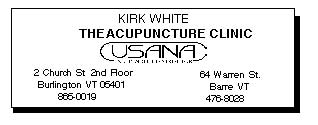
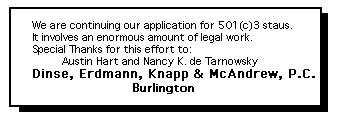
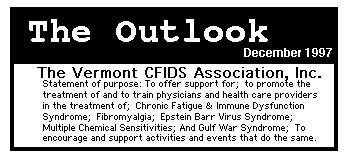
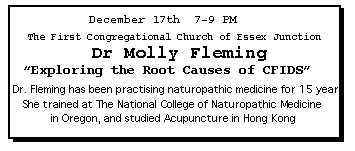
A Contiunued Statement of Purpose,...
On Seeking 501(c)3 Non-Profit Status
Since last January when we registered with the State of Vermont as The Vermont CFIDS Association, we having been working hard on our 501(c)3 application to be filed with the IRS. This is an enormous undertaking. Many long hours have been put in pro bono by Nancy DeTarnowsky and Austin Hart from the Law Firm of Dinse, Erdmann, Knapp & McAndrew. Just last week the finished application landed on my desk, ready for the final review, and then to be sent to the IRS well in advance of the IRS' deadline of fifteen months from the date of incorporation. The letter said please enclose the application "together with a check made payable to the IRS in the amount of 465.00 in payment of the IRS imposed user fee (see Form 8718). I had been unaware of the actual size of the filing fee.
By achieving non-profit status, we can apply for grants to fund this newsletter, maintain a schedule of support group meetings, schedule local speakers, and develop a directory of Physicians and Health Care providers with their credentials, experience, and histories of dealing with people with CFIDS.
Without non-profit status, much of this is not easily achieved.
We are optomistic of a very successful fundraiser with our Doll House Raffle. See page 3!
We have applied for a grant from the Vermont Community Trust, to fund this newsletter for one year and to include on the mailing list many smaller groups from around the state as well as the Fibromyalgia group in Chittenden County. We expect the total list to reach close to 1,000. One of the requirements for the grant is to have 501(3)c status. We hope that because the application is ready to be filed within the guidelines of the IRS that this requirement will be covered. We'll see. If we are turned down over this point, we expect to re-file in 6 months, after having achieved that staus.
If you can help, that's terrific. Better yet, if you could purchase a few DollHouse Raffle tickets you help us help ourselves. We are also in need of a few volunteers to 'man' the Dollhouse display at WalMart. Call 1-800-296-1445 and someone will call you back.
By working together we can find our recovery.
Happy Holidays.
A Working Physicians List
The singularly most common question we hear is "Do you know a good doctor?" And the single most common complaint, is that the current physician knows little, does little to treat the disease, and the patient is sent home in frustration to worsen. Lots of stories.
As we grow, a major goal is to publish a formal Physicians and Health Care Providers Referral. Until that time, and what follows, is an informal listing of Burlington area health care providers that are knowledgeable of CFIDS and skilled in its treatment. You can expect understanding, respect, and compassion.
We welcome any and all comments and suggestions, please.
Charles E. Anderson, M.D., FAAFP
175 Pearl Street, Essex Junction, VT 05452
802-879-6544
Lewis R. First MD Pediatrics - Consultation
Fletcher Allen Health Care Center
1 South Prospect Street
Burlington, VT 05401
802-656-0027
Molly Fleming, N.D., L.Ac.
Health Resolutions
41 Main Street, Burlington, VT 05401
802-863-7099
Bill Warnock, N.D.
Lake Champlain Center for Holistic Medicine
2 Harbor Road Shelburne, VT 05482
802-985-8250
Helen Klemchuk, Ph.D.
Associates in Psychology
20 South Main Street, St. Albans, VT 05478
802-527-7494
Donna M Powell, N.D. L.Ac.
Health Resolutions
41 Main Street, Burlington, VT 05401
802-863-7099
Lorilee Schoenbeck, N.D.
Lake Champlain Center for Holistic Medicine
2 Harbor Road, Shelburne, VT 05482
802-985-8250
TITLE: Increased concentrations of homocysteine in the cerebrospinal fluid in patients with fibromyalgia and chronic fatigue syndrome.
AUTHOR: Regland B;Anderson M.;Abrahamsson L.;Bagby J.Dyrehag LE
AFFILIATION: Institute of Clinical Neuroscience, Goteborg University, Sweden
ABSTRACT: Twelve outpatients, all women, who fulfilled the criteria for both fibromyalgia and chronic fatigue syndrome were rated on 15 items of the Comprehensive Psychopathological Rating Scale (CPRS-15). These items were chosen to constitute a proper neurasthenic subscale.
Blood laboratory levels were generally normal. The most obvious finding was that in all the patients, the homocysteine (HCY) levels were increased in the cerebrospinal fluid (CSF). There was a significant positive correlation between CSF-HCY levels and fatiguability, and the levels of CSF-B12 correlated significantly with the item of fatiguability and with CPRS-15. The correlations between vitamin B-12 and clinical variables of the CPRS-scale in this study indicate that low CSF-B12 values are of clinical importance. Vitamin B-12 deficiency causes a deficient remethylation of HCY and is therefore probably contributing to the increased homocysteine levels found in our patient group. We conclude that increased homocysteine levels in the central nervous system characterize patients fulfilling the criteria for both fibromyalgia and chronic fatigue syndrome.
Increased homocysteine levels found in cerebrospinal fluid of PWC's and PWFM's






